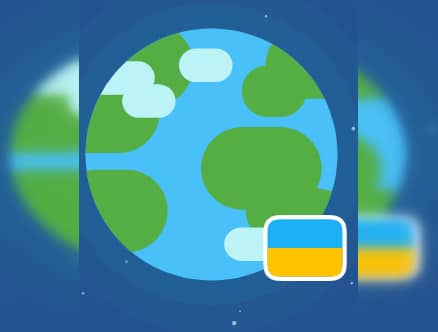Language learning app reports spike in global learners of Ukrainian

Posted March 14, 2022 3:44 pm.
According to the language learning app, Duolingo, since the start of the Russian invasion of Ukraine, users have been learning Ukrainian at the highest rate ever.
As Russia’s horrific attacks continue, many Ukrainians have been displaced. Many people are now welcoming refugees into their own homes, meaning the need to communicate in Ukrainian is very prevalent. According to Duolingo, the number of people learning Ukrainian has increased 485%.
Terry Wintonyk, a student at a Ukrainian language school in Vancouver has been learning Ukrainian for two years, and has some insight as to why so many people are compelled to take up the language.
“It’s probably, maybe an awakening of their ancestry or background, certainly the news has brought it to the forefront of people’s minds,” says Wintonyk, adding “Certainly people want to help and reach out to [refugees] coming from Ukraine.”
Related articles:
-
Advocate says process for Ukrainians coming to Canada re-traumatizing
-
SFU professor in Ukraine teaching virtually amidst attacks
-
Ukrainian woman in Poland says many refugees ‘feel guilty in safety’
According to Duolingo, most of the spike in interest is coming from the US, because most of the app’s users are based there, but in a letter from Duolingo’s CEO and co-founder Luis von Ahn, he mentions the number of learners in Poland has increased by more than 1800%, which he suspects is due to many Polish people who are welcoming and hosting refugees.
“Ad revenue from people studying Ukrainian will be donated to Ukraine relief, and refugees and hosts can use the premium version of Duolingo for free,” said Ahn in a statement.
The app remains free in Belarus and Russia, and Ahn says this is in an effort to allow education to those under regimes supporting the war.
“We believe that education is a human right. Language learning builds empathy and connection between cultures, and we believe there is value in continuing to teach the English language for free in Russia, given the current information environment in the country,” Ahn said.
Wintonyk has some advice for those learning the language, saying generally people are appreciative of the effort.
“People understand most things, even if you’re not pronouncing things correctly or any of that, a lot of people are definitely forgiving.”
He encourages learners to keep trying, even though he admits, “It’s a difficult language.”
“Everybody likes when you reach out to them in their native tongue.”








